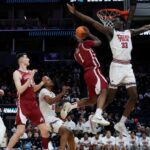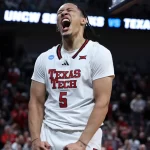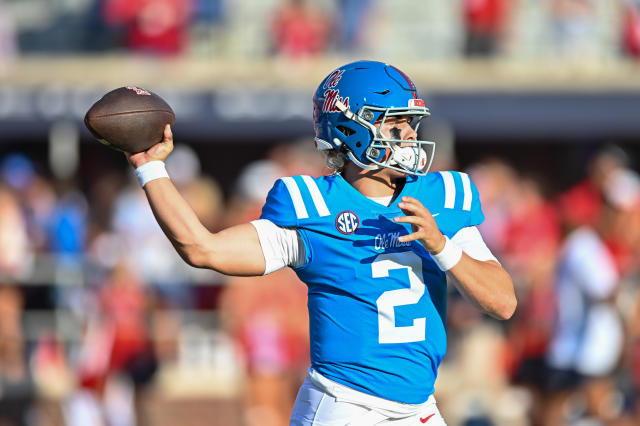Arkansas is away from Fayetteville for the fifth time in six times as they travel to Oxford to take on Ole Miss. Lane Kiffin’s Rebels are 4-1 and coming off arguably the best win of his tenure: a thrilling 55-49 win over LSU.
Before diving into the stats, let’s ask some tough questions about the offensive line.
Where are the dudes on the offensive line?
In press conferences this week, Pittman defended embattled offensive line coach Cody Kennedy, whose unit is not making life easy for the Razorback offense. Let’s take a look at the state of the offensive line, what all could be impacting its quality and performance, and how much of the blame Kennedy deserves for its struggles.
First, the history. Kennedy is in his third season as Arkansas’ offensive line coach. He was the lead recruiter for every offensive line recruit in the 2022 and 2023 classes. Before Kennedy, remember that Pittman’s first offensive line was Brad Davis, who coached the 2020 unit and was the lead recruiter for all signees in the 2020 and 2021 classes.
Here’s a year-by-year look at offensive line recruits that eventually saw the field under Pittman, with the head coach and offensive line coach who recruited them:
- 2017 (Bielema / Anderson): Dalton Wagner
- 2018 (Morris / Fry): Luke Jones*, Noah Gatlin
- 2019 (Morris / Fry): Ricky Stromberg, Brady Latham, Beaux Limmer, Myron Cunningham
- 2020 (Pittman / Davis): –
- 2021 (Pittman / Davis): Devon Manuel, Josh Street
- 2022 (Pittman / Kennedy): Andrew Chamblee, Patrick Kutas, E’Marion Harris
- 2023 (Pittman / Kennedy): – (these players are true freshmen)
*Jones transferred away, then transferred back and started in 2022
The problem should be pretty obvious: only two of the seven recruits signed in Pittman’s first two seasons have ever cracked the two-deep. The players from the 2020 and 2021 classes should be third- and fourth-year players by now. They should be the starters, but they aren’t here. Pittman’s first class – Marcus Henderson, Jalen St. John, and Ray Curry – is completely gone, with none of its members ever playing a significant snap in a Razorback uniform. The second class, which included consensus 4-star Terry Wells, is also gone except for Manuel, a part-time starter at left tackle, and Street, a backup guard who has barely played.
Offensive line isn’t as easy to plug-and-play like receiver. Even in the transfer portal era where quarterbacks, running backs, receivers, and defensive backs can turn around a program in a hurry (ask Colorado), it’s still an old-school position group, where years of development can pay off and there are no quick fixes (also ask Colorado). Arkansas basically whiffed on two classes. It didn’t hurt them then – they had starters already – but it’s hurting now that those guys should be starting.
Who’s to blame?
This seems to make the case we might have been a little harsh towards Kennedy, who was not responsible for the two lost classes. In fact, his recruits have successfully seen the field, with both of his consensus 4-stars (Chamblee and Kutas) recording multiple starts at both tackle positions despite being just redshirt freshmen. The tackle position, a weakness this year, is likely to be better in 2024 and strong in 2025.
We might be tempted to blame Davis, who left for LSU after the 2020 season, or Pittman himself, who is responsible for the whole operation. But I don’t think that’s right, either. Remember where Arkansas was in 2020. The Hogs were 1-23 in their last 24 SEC games. They got turned down by a bunch of coaches before Pittman said yes. And unlike Bobby Petrino in 2008, they didn’t have a huge crop of in-state prospects ready to turn the program around. Pittman and staff had to struggle to get anyone to sign. At the offensive line position, none of the guys they could get proved to be legitimate SEC players. Two lost classes left a “talent gap” that is coming of age right now. We’re seeing that mostly at the tackle spot, because two 2019 recruits still man the interior line, but the guard group will have its own crisis next year.
Development vs. execution
The talent gap from those two classes is the most obvious explanation, but it isn’t necessarily the only one. Kennedy may be absolved of recruiting challenges that happened before his tenure, but his job is still to take recruits and turn them into good players. Is he a good enough developer of the talent? I don’t know the answer to that, and I fear there are too many confounding variables. In addition to the lack of experienced tackles, Arkansas also changed offensive schemes.
Consider this point made on social media:
I looked at some games, and he’s right. On zone runs, linemen are not getting to the second level nearly as much this year as they were last year. That’s true even of the returning guys, Limmer and Latham. Is that a development problem?
The confounding variable here is the scheme. Even on the same plays (like, for example, inside zone), different offensive coordinators will have different ways they want the play executed. The coaching points vary from OC to OC. I don’t know their points of emphasis, but it seems likely that Kendal Briles, who is aggressive by nature, would emphasize getting to the second level to generate more big runs, while Enos, who is conservative by nature, would emphasize securing the first-level block. If that’s true, the difference isn’t a failure of execution by the line, but a change (probably for the worse) in how the play is supposed to be run. And if that’s true, the decline in run game production would be on Enos, not on Kennedy.
As for pass protection, the Hogs aren’t significantly worse than last year, but again there are scheme issues. Enos prefers longer-developing route concepts, requiring the quarterback to hold onto the ball longer, and uses less max protection (keeping tight end into block) than Briles did. The tackles weren’t great in pass pro last year, but they’re being asked to do more this year.
As a counterpoint, consider this play, highlighted nicely by Ruscin & Zach:
This is a Lock Read, a form of outside zone that the Hogs haven’t really used this year and didn’t run much of under Briles. Jefferson reads the unblocked defender and correctly keeps the ball. Now the hole is there, but it vanishes quickly because right tackle Kutas and right guard Josh Braun double-team the end, leaving the Aggie linebacker (#45), who looped around, unblocked.
The failpoint of this play – the end slanting inside against the run, drawing a double-block and freeing a teammate to make a play – may sound familiar, because that’s what Liberty repeatedly did to the Hogs in last year’s game. Remember this:

Pittman never offered a serious explanation as why this baffled Arkansas’ offense so much, as none of this stuff is particularly exotic. I think a lot of people blamed Kendal Briles… but there’s no Briles to blame now. Arkansas still hasn’t figured it out, and now Kennedy is the common denominator.
That said, all of the posts from Ruscin & Zach are worth looking at, as they highlight the same things I’ve seen: the tackles aren’t very good, but the offensive line is only a small part of a larger execution problem. The biggest single issue is what we talked about in the Texas A&M recap, that asking KJ Jefferson to be more a pro-style field general is not playing to his strengths and is instead exposing his weaknesses, which was the biggest concern I had about Enos entering the season. Jefferson repeatedly fails to recognize basic things like where the pressure is coming from and when he needs to audible out of certain plays. Briles kept things simple to turn loose his raw athleticism, while Enos is asking him to constantly diagnose what the defense is doing.
Assistant churn isn’t great
The takeaway of this discussion is that – considering that needless assistant churn is not good for the long-term health of a program – it might be worth engaging some critical thinking before declaring that the offensive line coach needs to be fired because the offensive line isn’t very good this year.
Views of Kennedy’s performance are being affected by two things beyond his control: first, a talent gap caused by a couple poor recruiting classes that were before his time and reflective of program health at the time, and second, a change in scheme that may be handcuffing run game productivity.
When you go through the chaotic times that Arkansas went through from 2017 to 2020 – the ugly decline of the Bielema era, the disastrous Morris era, then a weird COVID year – there will be impacts that are felt for years after. There’s a good chance that swapping offensive line coaches would do nothing to mitigate this problem and could instead risk disrupting recruiting and development at the position, thus pushing the timeframe of when Arkansas will have a good offensive line even further into the future.
- Box Score Breakdown: Texas Tech 85, Arkansas 83

- Matchup Analysis: 3 Texas Tech

- Box Score Breakdown: Arkansas 75, St. John’s 66

Meet the Rebels

Ole Miss got thumped in their annual showdown with Nick Saban and Alabama, but they haven’t lost otherwise and are coming off a thrilling 55-49 win over LSU that might be the best win of the Lane Kiffin era.
Despite a nice lineup of names in their wins – LSU, Tulane on the road, Georgia Tech – our models aren’t overly impressed with the Rebels, as they were soundly beaten by Alabama and didn’t dominate Tulane. They check in at just 40th overall in our predictive model, which thinks this might actually be a close game:

That’s something close to a toss-up. Our models say Texas A&M is the best team Arkansas will face this year, and LSU (20th) and Alabama (21st) are essentially tied for second. So two of the three toughest are already off the schedule. All of Arkansas’ remaining games except for Alabama have a projected margin within five points, except for FIU.
When Ole Miss has the ball

The Rebel offense looks like Arkansas’ under Kendal Briles, for the obvious reason that it comes from a similar branch of the philosophical tree. The Rebels generate a lot of big plays (16th in explosive rate), particularly on early downs (11th in standard downs EPA), and are vulnerable to negative plays (60th in havoc rate).

The passing offense, led by veteran QB Jaxson Dart, is humming along. Kiffin created some offseason drama by adding Oklahoma State transfer Spencer Sanders to give Dart some competition, and he’s responded by stepping up his game.
That last line – sack rate – is Arkansas’ only advantage. And that’s actually a theme. The discussion about Cody Kennedy and the offensive line from the start of this post was timely, because Ole Miss is going through the same thing right now. Kiffin and Pittman both were hired in late 2019, and for both, their first recruiting class included a lot of misses on the offensive line. The Rebels have just three linemen from the 2020 and 2021 classes on their current 10-man two-deep, and only one starts. They start two transfers that they had to bring in to fill gaps in their depth.

In addition to ranking 70th in sack rate, the Ole Miss run game has taken a big step back, and it’s almost all on the offensive line. After leading the SEC in rushing last year, Quinshon Judkins is having a hard time finding space, and the Rebels rank 77th in line-yards per rush, 93rd in stuff rate, and 95th in rushing success rate. When he can find space or break a tackle, he’s very dangerous (30th in explosive rate), but space has been hard to come by.
This presents a big opportunity for the Razorback defense, because Ole Miss is still going to try to run the ball as part of their offensive balance. The Hogs may can shut down – or least significantly slow down – the Rebel run game and pressure Dart, which would make it hard for Ole Miss to score enough points to run away with this game easily.
When Arkansas has the ball

Woof, that’s a lot of red. This game features a bad offense against a bad defense. The Rebels’ defense is the inverse of its offense: they allow far too many explosive plays (107th), especially on early downs (121st), but their saving grace is that they aren’t horrible at getting off at the field when they get the offense behind the chains (21st).
This presents a somewhat difficult matchup for the Hogs, as they are not built to punish the Rebels on early downs (105th) or with big plays (104th).

The Ole Miss front isn’t particularly scary against the run, so the Hogs should be able to grind out short gains. The lack of explosive runs is, as mentioned above when talking about the line, probably more related to scheme than talent. After all, it was friend of Fayette Villains Clark Brooks, aka SEC Stat Cat, who told Pittman at SEC Media Days that Enos’s offense doesn’t produce many explosive plays, to which Pittman snarkily responded, “Was that a question?” It’s a question, now, coach! A question that the analytics nerds all saw coming.
Anyway, there’s enough in these numbers to give optimism that the Hogs might be able to grind out some success on the ground while stopping Ole Miss’s run game, which would be a major advantage for the good guys. The margin will be razor-thin, but it’s doable.

The Rebel defense is content to pin their ears back and rush the quarterback (13th in sack rate), living with the results if they don’t get there (130th in explosive play rate). Arkansas, on the other hand, takes a ton of sacks (129th) with very little positive to show for it (76th in explosive play rate). This boom-or-bust defense is going to force Arkansas to get creative to protect Jefferson, which is an issue, because as we’ve noted many times, Enos’s scheme requires a quarterback that can identify the pressure pre-snap, audible out of bad plays, and find the hot read. Jefferson doesn’t seem to do any of those things well, as Arkansas has repeatedly run plays right into the strength of opposing defenses.
Whether its simplification by Enos or increased recognition skills by QB1, something’s got to give or Arkansas’ passing game will continue to be a mess.
Keys to the Game
Tackle in space. Arkansas has a good chance to slow down the Ole Miss run game and force Jaxson Dart to win with a pass-heavy attack. Of course, Ole Miss might be fine with that if Arkansas can’t tackle in space. With cornerback Dwight McGlothern questionable – I’m thinking more doubtful – to play, that task is pretty hard. But if the Hogs can do it, the defense will be in good shape.
Win in the trenches. Ole Miss is fairly weak on both lines, giving Arkansas a big chance to win an old-school trench fight. If the Hogs can maintain a huge efficiency gap in rushing and also pressure Dart, I like their odds.
Throw downfield. Jefferson hasn’t been consistently accurate on short throws over his career to keep the offense moving without any big plays. We’ve seen this in Arkansas’ red zone struggles and the large number of negative plays that the Arkansas offense takes. I think Arkansas needs to hit several big throws down the field to have a chance. That may mean risking some sacks… but Arkansas risks that every time they drop back to throw.
Thanks for reading! Be sure to follow us on Twitter and on Facebook.
The latest from Fayette Villains, straight to your inbox
Enter your email to subscribe and receive new post alerts and other updates. You can unsubscribe at any time.
